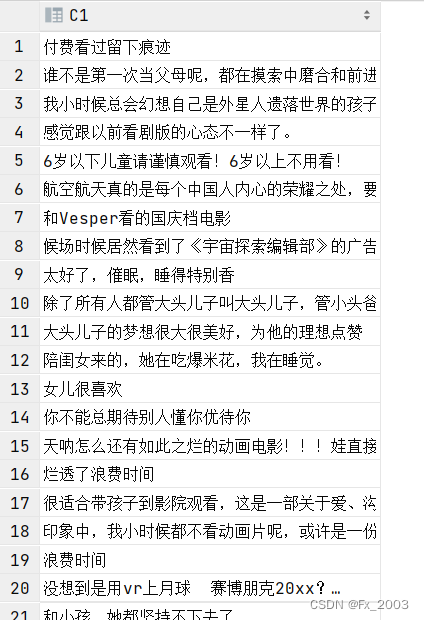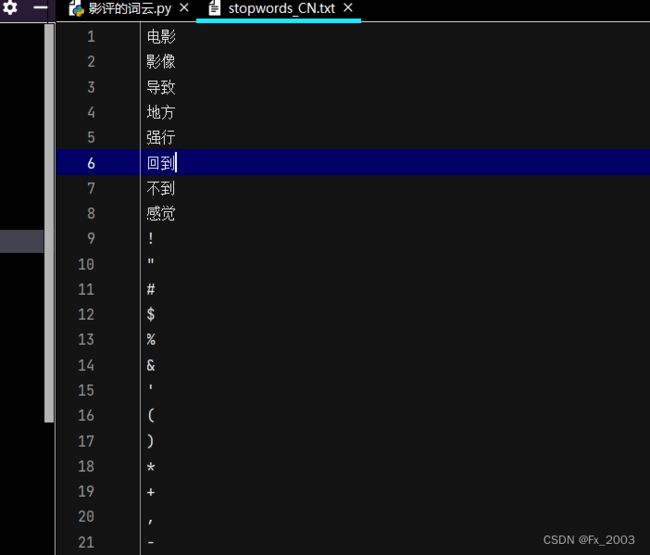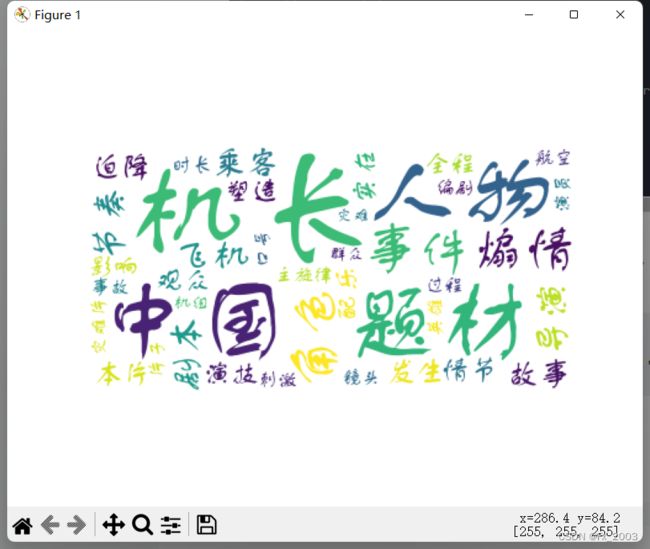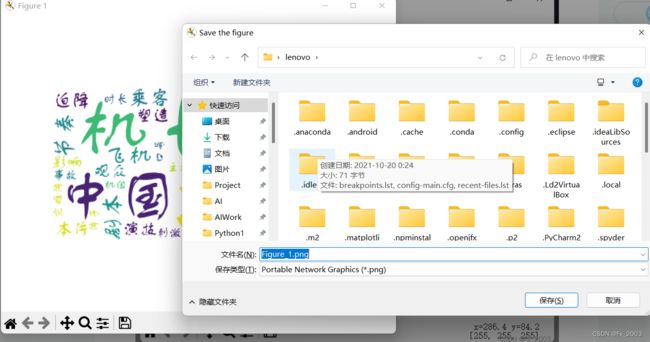【爬虫】爬取影评并根据词频制作词云思路
目录
前言:
第一步:爬取最近上映的电影的3个信息,如下
代码如下:(getMovie()方法)
第二步:输出前三页的影评
分析:
代码如下:(getCommens()方法)
效果图
第三步:统计词频,除去一些’停用词‘(数据处理)
先看代码:(Clean()方法)
效果图:
第四步:绘制词云并显示
效果图:
保存图片:
总的代码如下
前言:
本案例基本目标:爬取影评(获取数据)并进行数据分析(数据处理筛选)并绘制词云
基本功能:输出最近商业电影的ID,电影名,和主演。
我们根据上面的输出,输入电影的ID号,然后自动爬取该前3页的影评并输出
然后绘制词云
可能需要一些基础
推荐博客
相关基础知识:
【WordCloud】生成词云_保住头发的破风小子的博客-CSDN博客_根据字典生成词云
Python数据分析(4):jieba分词详解_zdb呀的博客-CSDN博客_jieba分词
第一步:爬取最近上映的电影的3个信息,如下
效果图:
首先来分析网站:
最近上映的都放在div标签下 id ='nowplaying'下,
需要爬取的三个内容都在li标签下,并且class都一样,所以我们find_all。并且把三个内容分开放在字典中
清楚节点元素,然后就可以爬取了:
代码如下:(getMovie()方法)
# 获取每部电影的id,name,actors
def getMovie(self):
req = requests.get(url, headers=self.headers)
req.encoding = chardet.detect(req.content)['encoding']
soup = BeautifulSoup(req.text, 'html.parser')
# print(soup)
nowplaying = soup.find('div', id='nowplaying')
movie_list = nowplaying.find_all('li', class_='list-item')
# print(movie_list)
# print(type(movie_list[0])) #
# print(movie_list[0])
for mov in movie_list:
playing_dict = {'id': mov['data-subject'], 'name': mov['data-title'], 'actors': mov['data-actors']}
self.playing_list.append(playing_dict)
# print(playing_list) 这里通过字典分开存储id,name和actors
第二步:输出前三页的影评
分析:假如网址结构如下
# subject/6666666/comments?start=20&limit=20
# subject/6666666/comments?start=40&limit=20
# subject/6666666/comments?start=60&limit=20
影评网址的变化,我们可以知道:
1、一页显示20条,我们需要3页也就是60条
2、分析网址的变化,第一页start=20,第二页start=40,实际上是递增20,所以我们直接定义一个num=20,进行一次循环加20就行了
3、subject后面的一串数字是什么呢?
就是我们选择的电影的ID,所以,我们可以根据第一步爬取的ID,来完善这个url
就像这样:
link = '.../subject/{id}/comments?start={num}&limit=20&status=P&sort=new_score'.format(
id=Id,
num=num)代码如下:(getCommens()方法)
# 获取电影的影评
def getComments(self, Id):
# id = 26654184
num = 20
for i in range(4):
print('这是第{}次循环:'.format(i + 1))
print(num)
num += 20
link = 'xxxxx/subject/{id}/comments?start={num}&limit=20&status=P&sort=new_score'.format(
id=Id,
num=num)
req = requests.get(link, headers=self.headers).content.decode('utf-8')
time.sleep(2 + random.choice([0.1, 0.3, 0.2, 0.4, 0.5, 0.6, 0.7, 0.8, 0.9, 1.3]))
# print(req)
soup = BeautifulSoup(req, 'html.parser')
comments_get = soup.find_all('span', class_='short')
for comm in comments_get:
comment = comm.text
print(comment)
self.comments.append(comment)
return self.comments
上面使用了time.sleep,来模拟休眠时间,毕竟人不可能卡着时间秒的来浏览,爬虫就是要看着像人,所以在休眠2的基础上,加上一个随机数(从列表中选一个)
上面的代码改一下,可以把评论写入本地文件
time.sleep(2 + random.choice([0.1, 0.3, 0.2, 0.4, 0.5, 0.6, 0.7, 0.8, 0.9, 1.3]))
# print(req)
soup = BeautifulSoup(req, 'html.parser')
comments_get = soup.find_all('span', class_='short')
with open("{}的影评.csv".format(Id), 'a+',encoding='gbk',errors='ignore') as f:
for comm in comments_get:
comment = comm.text
f.writelines(comment)
f.write('\n')
print(comment)
self.comments.append(comment)效果图
第三步:统计词频,除去一些’停用词‘(数据处理)
先看代码:(Clean()方法)
# 数据的清洗
def Clean(self,Id):
# 数据清洗
self.getComments(Id)
comments_clean = '' # 为了方便清洗我们放在一个字符串中
for comm in self.comments:
comments_clean = comments_clean + (str(comm)).strip()
print(comments_clean)
# 去掉标点符号
pattern = re.compile(r'[\u4e00-\u9fa5]')
comments_clean = ''.join(re.findall(pattern, comments_clean))
# print(comments_clean)
# 词频统计
results = jieba.analyse.textrank(comments_clean, topK=50, withWeight=True)
keywords = dict()
for comm in results:
keywords[comm[0]] = comm[1]
print('没有删除停用词之前的数据:\n', keywords)
with open('../../file/stopwords_CN.txt', 'r') as f:
stopwords = f.read()
keywords = {x: keywords[x] for x in keywords if x not in stopwords}
print('\n删除停用词后的数据:\n', keywords)
return keywords效果图:
这里打开了一个本地的stopword_CN.txt文件,它的部分内容如下:
去除掉一些没啥实际含义的词,例如:我觉得、只有。。。。
第四步:绘制词云并显示
a = DownCloud()
a.getMovie()
print('最近上映的电影有:')
for each in a.playing_list:
display(each)
print('===============我是分割线===============')
ID = input('请输入你要查看词云的电影的ID:')
time.sleep(1)
# a.getComments()
# print(a.comments)
word = a.Clean(ID)
print(word)
matplotlib.use('TkAgg')
w = WordCloud(font_path='../../file/FZSTK.TTF', background_color='white', max_font_size=100)
w.generate_from_frequencies(word)
plt.imshow(w)
plt.axis('off') # 不显示坐标轴
plt.show() # 显示图像其中:FZSTK.TTF是一个字体(中文),假如去掉这个参数,可能词云显示不出中文,而显示方框框
字体文件可以到自己的电脑上找:
matplotlib.use('TkAgg') 加这么一句是因为不加可能报错
出现了错误:module 'backend_interagg' has no attribute 'FigureCanvas'
效果图:
保存图片:
左边的最右下的哪个按钮,点一下
总的代码如下
# -*- coding: utf-8 -*-
"""
@File : 影评的词云.py
@author: FxDr
@Time : 2022/11/08 19:53
"""
import random
import time
import requests
import chardet
from IPython.core.display_functions import display
from bs4 import BeautifulSoup
import re
import jieba.analyse
import matplotlib
import matplotlib.pyplot as plt
from wordcloud import WordCloud
class DownCloud:
def __init__(self):
# 在尝试代码中,假如次数比较多,那么可能被制裁:提示IP异常发出请求啥的,让你登录,这样
就爬取不到了,所以我直接用了cookie
self.headers = {
'User-Agent': 'xxxxxx',
'Cookie': ''
}
self.playing_list = []
self.comments = []
# 获取每部电影的id,name,actors
def getMovie(self):
req = requests.get(url, headers=self.headers)
req.encoding = chardet.detect(req.content)['encoding']
soup = BeautifulSoup(req.text, 'html.parser')
# print(soup)
nowplaying = soup.find('div', id='nowplaying')
movie_list = nowplaying.find_all('li', class_='list-item')
# print(movie_list)
# print(type(movie_list[0])) #
# print(movie_list[0])
for mov in movie_list:
playing_dict = {'id': mov['data-subject'], 'name': mov['data-title'], 'actors': mov['data-actors']}
self.playing_list.append(playing_dict)
# print(playing_list)
# 获取电影的影评
def getComments(self, Id):
# id = 26654184
num = 20
for i in range(4):
print('这是第{}次循环:'.format(i + 1))
print(num)
num += 20
link = '.......{id}/comments?start={num}&limit=20&status=P&sort=new_score'.format(
id=Id,
num=num)
req = requests.get(link, headers=self.headers).content.decode('utf-8')
time.sleep(2 + random.choice([0.1, 0.3, 0.2, 0.4, 0.5, 0.6, 0.7, 0.8, 0.9, 1.3]))
# print(req)
soup = BeautifulSoup(req, 'html.parser')
comments_get = soup.find_all('span', class_='short')
for comm in comments_get:
comment = comm.text
print(comment)
self.comments.append(comment)
return self.comments
# 数据的清洗
def Clean(self,Id):
# 数据清洗
self.getComments(Id)
comments_clean = '' # 为了方便清洗我们放在一个字符串中
for comm in self.comments:
comments_clean = comments_clean + (str(comm)).strip()
print(comments_clean)
# 去掉标点符号
pattern = re.compile(r'[\u4e00-\u9fa5]')
comments_clean = ''.join(re.findall(pattern, comments_clean))
# print(comments_clean)
# 词频统计
results = jieba.analyse.textrank(comments_clean, topK=50, withWeight=True)
keywords = dict()
for comm in results:
keywords[comm[0]] = comm[1]
print('没有删除停用词之前的数据:\n', keywords)
with open('../../file/stopwords_CN.txt', 'r') as f:
stopwords = f.read()
keywords = {x: keywords[x] for x in keywords if x not in stopwords}
print('\n删除停用词后的数据:\n', keywords)
return keywords
a = DownCloud()
a.getMovie()
print('最近上映的电影有:')
for each in a.playing_list:
display(each)
print('===============我是分割线===============')
ID = input('请输入你要查看词云的电影的ID:')
time.sleep(1)
# a.getComments()
# print(a.comments)
word = a.Clean(ID)
print(word)
matplotlib.use('TkAgg')
w = WordCloud(font_path='../../file/FZSTK.TTF', background_color='white', max_font_size=100)
w.generate_from_frequencies(word)
plt.imshow(w)
plt.axis('off') # 不显示坐标轴
plt.show() # 显示图像





